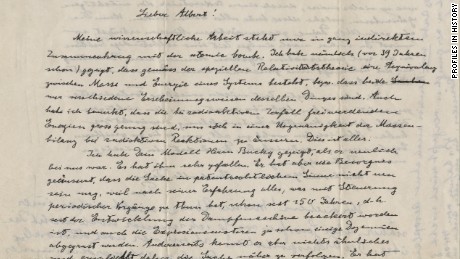Story highlights
- A letter about the connection between Einstein's special relativity theory and the atomic bomb sold for $62,500
- Topics of the 27 letters ranged from religion to the atomic bomb to infidelity
(CNN)What did Albert Einstein think about adultery, the atomic bomb and God?
At an auction last week, bidders shelled out just over $420,000 to own a piece of the Nobel prize winner's letters tackling these topics and other questions he faced during his lifetime.
Organizers said the highlight of Thursday's auction -- which included 27 letters from Einstein -- was a 1945 letter about the connection between his special relativity theory and the atomic bomb.
The genius physicist sent it to his son Hans less than a month after the bombings of Hiroshima and Nagasaki, and it sold for $62,500, according to the Profiles in History auction house in Calabasas, California.
A 1939 communication from Einstein to President Franklin Roosevelt helped start the U.S. efforts to build an atomic bomb, but Einstein later said he regretted taking that step.
In the letter to his son in 1945, Einstein wrote that his work and the bomb were "only very indirectly connected."
"I already showed 39 years ago that pursuant to the special relativity theory, there is an equivalence between the mass and energy of a system or that both are only different manifestations of the same thing," he wrote. "I also noted that the energies released in radioactive decay are big enough to express themselves in an inaccuracy of the mass balance of radioactive reactions. That's all."
The letters -- most written in German but some in English -- offer an inside look at Einstein's personal beliefs, like his thoughts about religion and the likelihood of the existence of God.
In a 1945 letter to Guy H. Raner, Einstein described himself as an atheist.
"From the viewpoint of a Jesuit priest I am, of course, and have always been an atheist. ... It is always misleading to use anthropomorphical concepts in dealing with these outside of the human sphere -- childish analogies," he wrote, according to the auction organizers.
Four years later, he wrote to Raner again. But this time, according to auction's organizers, his views seem to have shifted. He disparaged atheism and instead declared himself agnostic.
"I have repeatedly said that in my opinion the idea of a personal God is a childlike one," he wrote. "I prefer an attitude of humility corresponding to the weakness of our intellectual understanding of nature and of our own being."
While many of the letters addressed his scientific work, religion and major political events of the time, Einstein also took time to share more personal thoughts with close friends and family.
In another letter to his son Hans, he promised to send math problems to solve. And in a letter to a friend, he offered words of encouragement after learning of her husband's infidelity.
In total, the letters generated $420,625, the auction house said.
"The auction was extremely successful," said Marc Kruskol, a spokesman for Profiles in History. "The Einstein letters sold for more than we expected."






